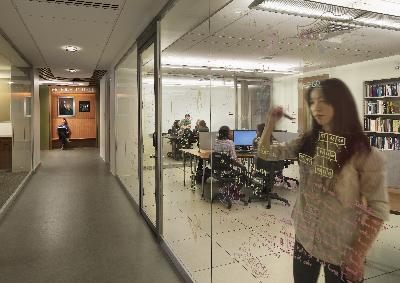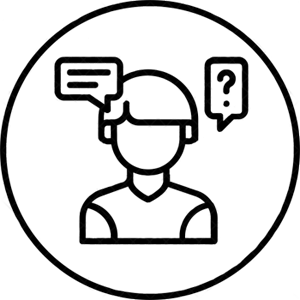Computer Engineering
Program Overview
The work of computer engineers impacts every industry in today’s interconnected world. Technology is an integral part of every organization from businesses to governments and requires continuous attention to compete in the globalized world.
Connecting the fields of electrical engineering and computer science, computer engineers design and improve new computer applications, embedded systems, software systems, data storage and security for government, defense, and industry.
Conducting research to design, computer engineers develop and refine computer systems and applications, continually pushing the limits of modern technology. With a thorough understanding of the principles of electrical engineering and computer science, computer engineers analyze hardware and software to troubleshoot and improve computer-related functionality — from singular devices and applications to whole systems and networks.
"Computer engineering has helped me develop as a critical thinker, algorithmic thinker, and as an ethical thinker. I learn a lot about technology, but also about what it means to be an engineer professionally and how to work with others."
Vincent Oliverio '21, Computer Engineering Major
At The University of Scranton, you will have the opportunity to explore your interests with the support of dedicated faculty, access to advanced equipment, and a range of challenging courses — from physics and calculus to advanced robotics and embedded systems — with continuous connections and applications to real-world problems. You'll come away not only understanding today's technology but prepared to understand future technology.
The computer engineering program at Scranton prepares you for a career in either electrical and computer engineering and advanced studies in those fields.
Above: Students attend the IEEE Region 2 Student Activities Conference at The University of Pittsburgh.
"The labs are something about my major I like, especially the modern physics lab. I'm able to conduct experiments based on theories I studied in class, which is possible because the labs are equipped to provide the students with instruments necessary to complete these experiments."
Andrew Charway '20, Computer Engineering Major
 In Loyola Science Center, state-of-the-art classrooms, teaching laboratories, research spaces, faculty offices, and informal gathering spaces reflect the interactive nature of science and encourage active participation.
In Loyola Science Center, state-of-the-art classrooms, teaching laboratories, research spaces, faculty offices, and informal gathering spaces reflect the interactive nature of science and encourage active participation.
Curriculum
The technical core of the program emphasizes theoretical and laboratory skills, hardware and software skills, simulation and design. Technical courses are taught by faculty from both computer science and electrical engineering, ensuring balanced coverage and integration of hardware and software while basic science courses are taken with faculty from physics and chemistry, ensuring the depth and breadth of the coverage of these topics. The design process is also emphasized throughout the four years.
The computer engineering program culminates in a two-term capstone senior project where each student must design, construct, program, and debug a self-guided, artificially intelligent robot.
View Computer Engineering Curriculum
Accreditation

Program Name: Computer Engineering (B.S.)
The Computer Engineering (B.S.) program is accredited by the Engineering Accreditation Commission of ABET, https://www.abet.org, under the General Criteria and the Program Criteria for Electrical, Computer, Communications, Telecommunication(s) and Similarly Named Engineering Programs.







